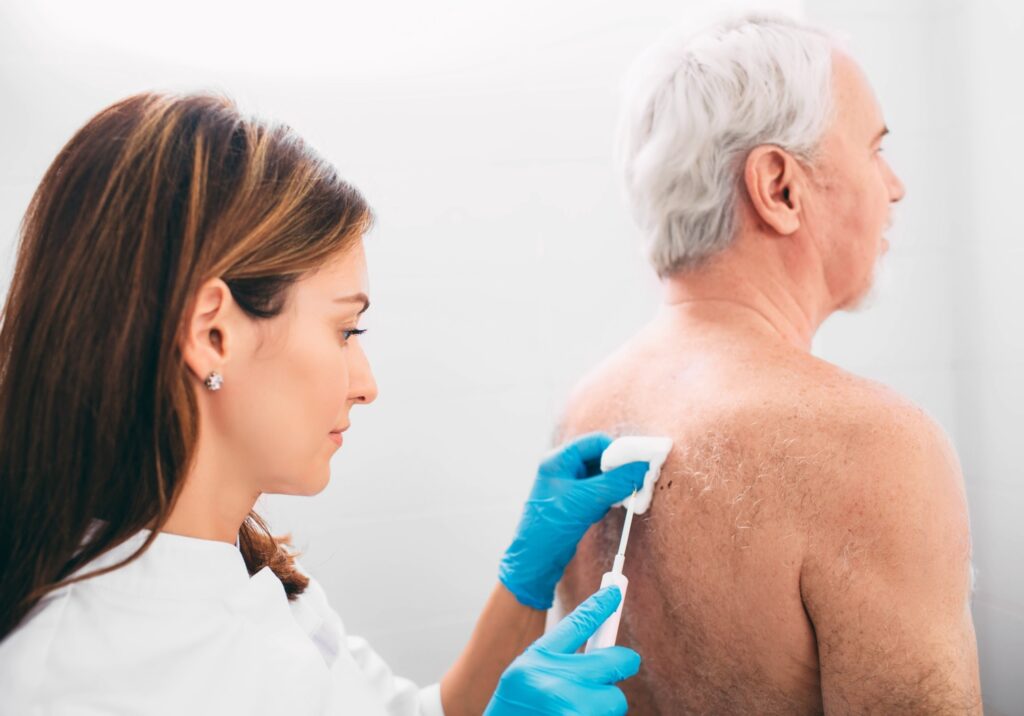
Dry and itchy skin: Is this normal, or is it something worse? Your skin may become dry because of the weather, taking hot showers, or using drying soaps. Dryness and itching can also be due to underlying medical conditions such as eczema or dermatitis.
Our skin is the window to our health. What we take in and how we care for our bodies reflect on our skin. It’s important never to overlook even the smallest issues, such as dryness and itching, especially when these conditions persist. A visit to a dermatologist will provide a diagnosis and ensure you’re getting the right treatment.
Why Is Your Skin So Dry and Itchy?
Dry skin has a rough texture because of poor moisture. Sometimes, dry skin also becomes itchy, especially when it is caused by skin conditions such as eczema and psoriasis. Let’s explore the reasons why skin becomes dry and itchy.
Environmental Causes
Several environmental factors lead to dry and itchy skin. One of these is exposure to dry and cold weather and low humidity. Exposed skin on the face, neck, arms, and hands become dry, chaffed, and sometimes itchy.
Also, harsh soaps can dry skin as these products strip the skin of its natural oils. Taking long, hot showers also leads to dry skin and can worsen already dry and itchy skin.
Underlying Medical Conditions
People can suffer from dry and itchy skin when they have underlying conditions such as eczema and psoriasis. Eczema is a common condition that weakens the skin barrier, which is critical to retaining moisture. Thus, the skin becomes very dry, itchy, and bumpy.
Meanwhile, psoriasis is a long-term skin disease that causes rashes, itchy, and scaly patches along the knees, elbows, scalp, and torso. Dry and itchy skin in psoriasis goes through cycles and flares up for weeks to months.
Allergic Reactions or Irritants
Reactions to irritants or substances can also lead to itching and rashes. These substances include cosmetics, perfumes, cleaning products and wool. Additionally, taking certain medications, such as opioids, for pain can cause itchy skin.
Signs It’s Time to See a Dermatologist
It’s time for a visit to a GP or your dermatologist if you notice the following red flags:
1. Prolonged Discomfort
If your dry skin and itching last for weeks and do not heal even after using moisturisers, or if they come back after a few days and affect your concentration at work, school, or home, it’s time to get your skin checked.
2. Bleeding
If dry and itchy skin is accompanied by bleeding and open cuts or sores, you should visit a doctor sooner rather than later. Open cuts and sores must be treated and protected to avoid infection and further irritation.
3. Scaly Patches
Scaly skin occurs when the outer skin layer peels away in large flakes. It is a common sign caused by factors such as allergies, infections, and skin conditions such as psoriasis and eczema. Dry and scaly skin is common in older people as their skin becomes drier because oil glands in the skin are less effective.
4. Signs of Infection
We encourage you to book a consultation to see Dr Ritu or her specialist clinical staff if your dryness and itching are accompanied by redness, swelling, pain, and pus formation. Other signs of infection include fever, headaches, and weakness.
5. Why self-treatment doesn’t always work
Self-treatment measures for dry and itchy skin may not always work because the underlying issue may be more complex. Some cases, such as eczema or psoriasis, need professional diagnosis and treatment.
How dermatologists diagnose skin conditions
Dermatologists like Dr Ritu diagnose skin conditions by thoroughly examining each patient’s skin and assessing family history for any related skin conditions. We may also conduct tests such as biopsies and skin cultures.
Medical Treatment Options for Dry Skin
Prescription creams or ointments
Depending on the severity of your condition, dermatologists may often prescribe creams or ointments, such as topical corticosteroids, immunomodulators, anti-itch creams, and other medications, to combat dryness and itching.
Corticosteroids, antihistamines, immunosuppressants
These medications can treat dry and itchy skin due to eczema or psoriasis. Corticosteroids reduce inflammation and itching. Antihistamines block histamine to reduce itching. Meanwhile, immunosuppressants suppress the immune system to reduce inflammation and avoid flare-ups.
Light therapy (Phototherapy)
Light therapy is a noninvasive solution that can help manage chronic skin conditions such as eczema and psoriasis. It can reduce inflammation, ease itching, and help skin heal more effectively.
Professional Skin Care Treatment at Dr Refresh
Dr Refresh can help revitalise dry and itchy skin. Depending on the cause of dryness and itching, we integrate several treatment models to reduce symptoms and restore the skin’s health and wellness.
After a thorough assessment, we create a personalised treatment routine consisting of specialised procedures, prescription medications, and medical-grade topical skincare.
Our dermatologist-led team has years of experience working with various clients, addressing issues such as dryness, itching, and rashes. Every client is unique, so we start every treatment with a thorough assessment and evaluation.
End dryness and itching and start feeling refreshed! Book a consultation with Dr Refresh now.
FAQs
1. What is the most common cause of dry, itchy skin?
The most common cause of dry and itchy skin is exposure to cold and dry environments, taking long, hot showers, and using harsh soaps.
2. Can dry skin be a sign of something serious?
Dry skin could be a sign of an underlying medical condition, such as psoriasis or eczema. Therefore, persistent dry and itchy skin should never be overlooked.
3. What kind of moisturiser is best for dry skin?
For dry skin, a gentle, scent-free moisturiser is best. This helps improve the skin’s moisture content without causing irritation.
4. How often should I moisturise?
Moisturise twice daily, including immediately after a bath or shower. Apply moisturiser on the skin to lock in moisture.
5. Should I see a GP or a dermatologist for dry skin?
Visit a GP or a dermatologist for persistent dry skin, especially when skin shows signs of infection: redness, itching, pain, swelling, and pus formation. A dermatologist can also help assess underlying conditions contributing to dry and itchy skin.

